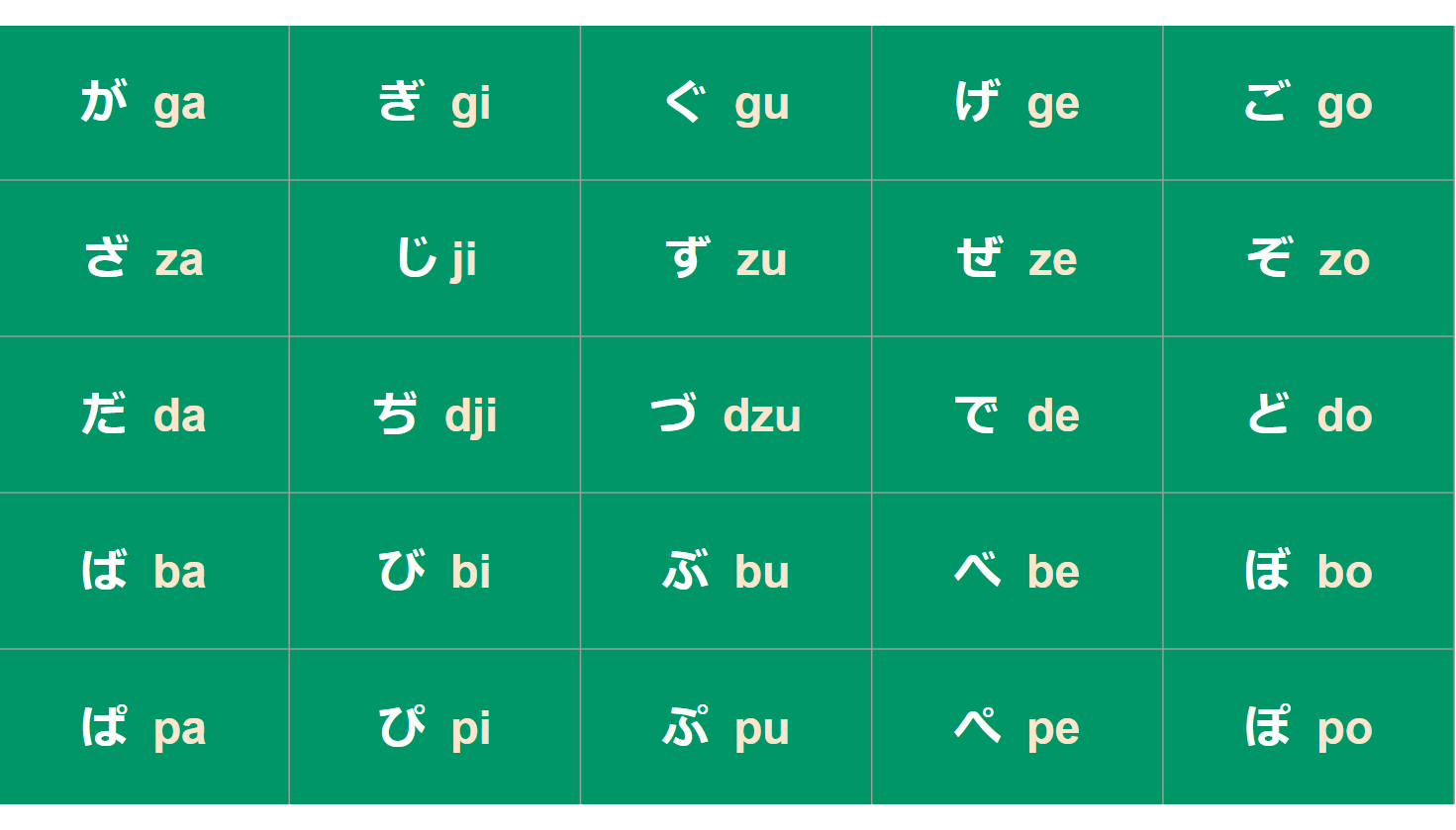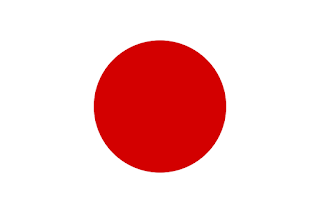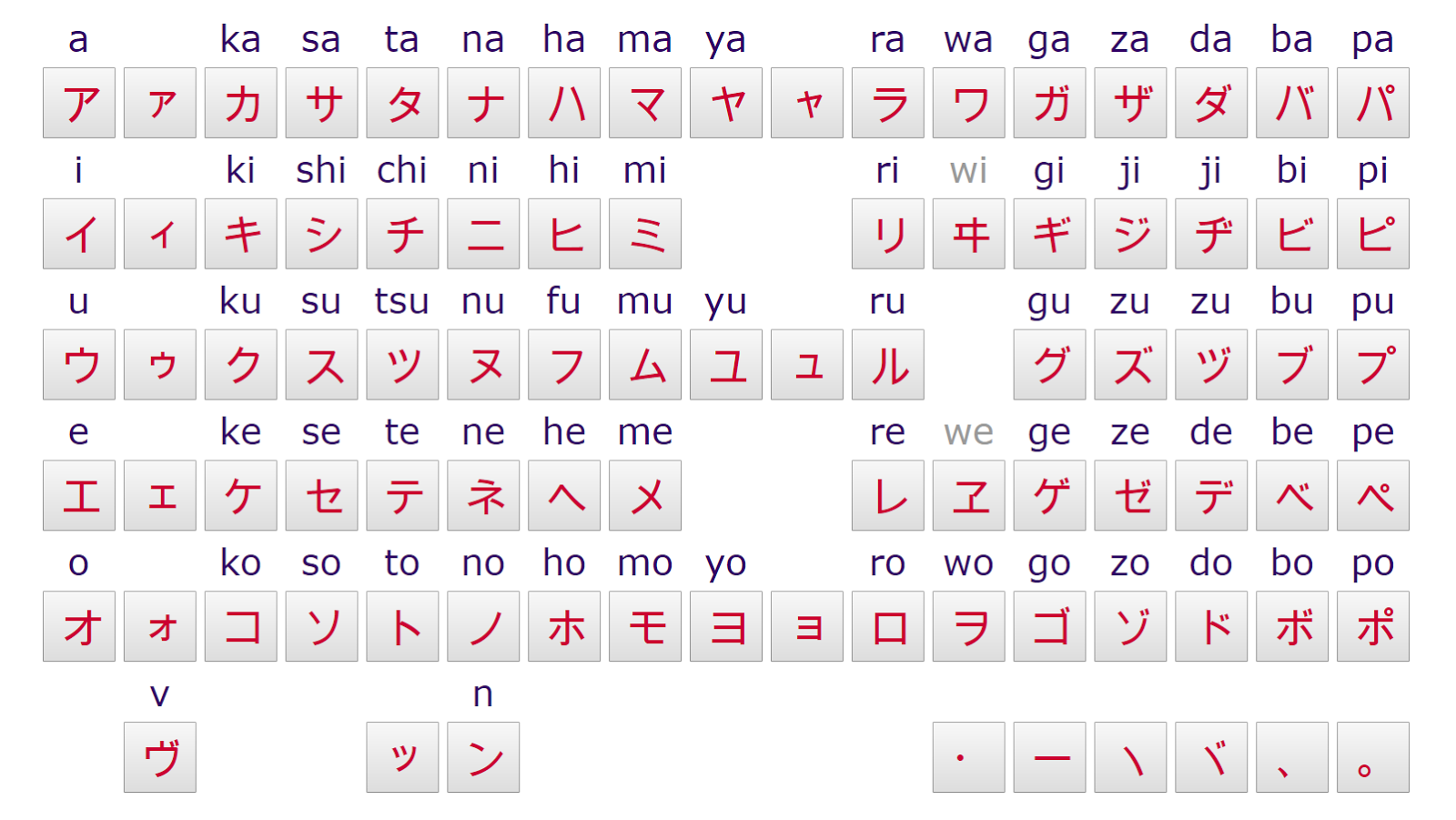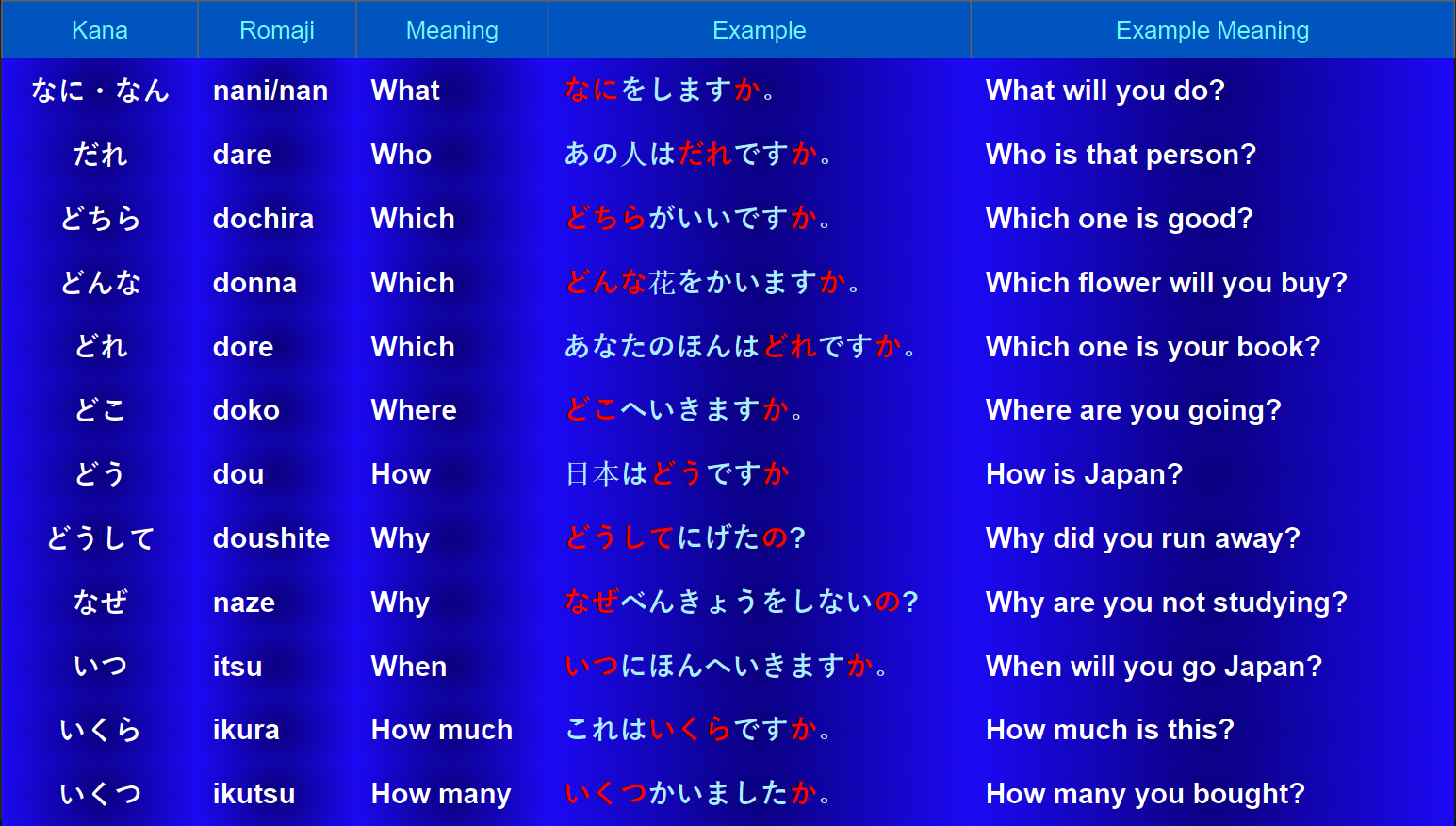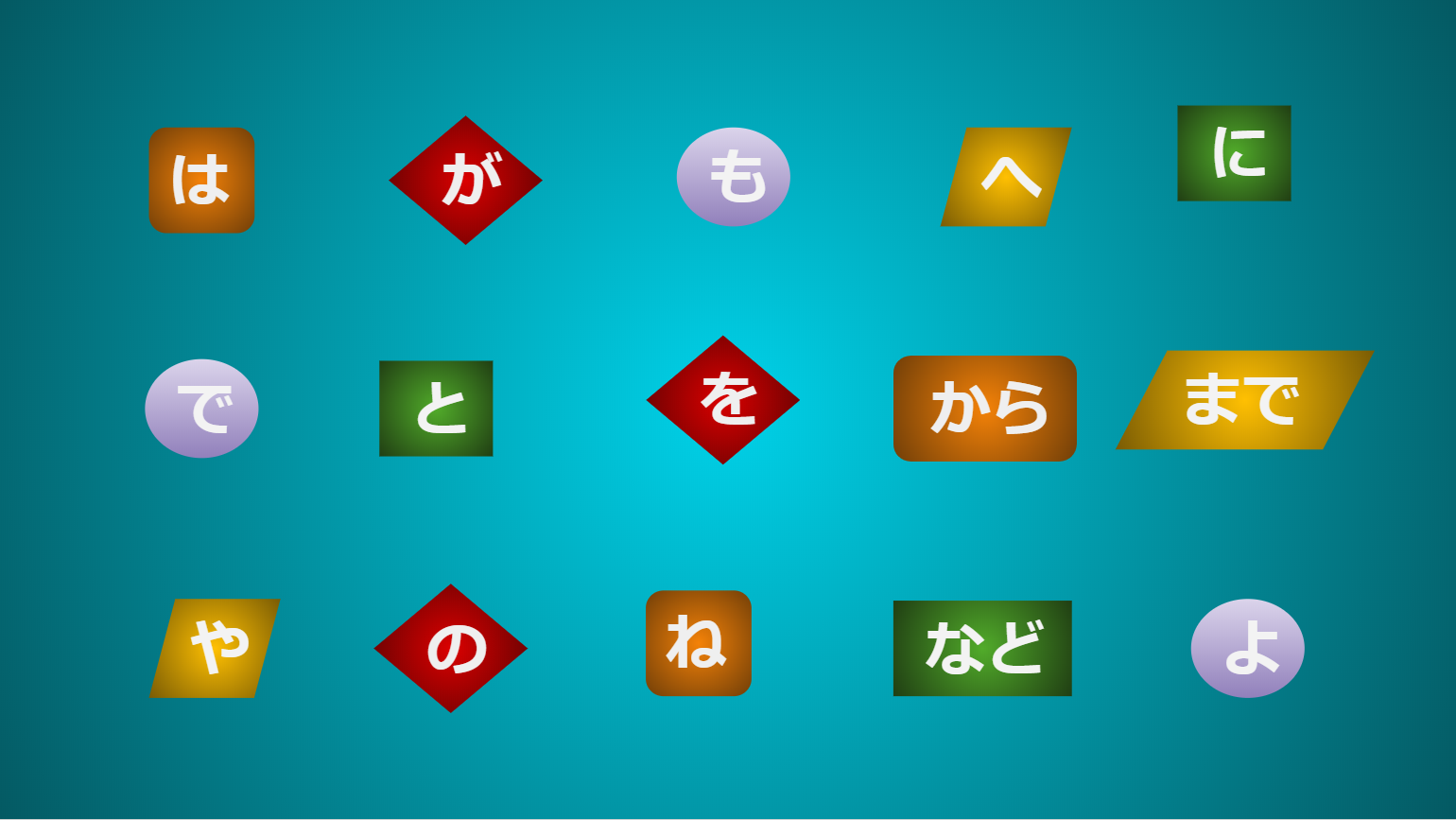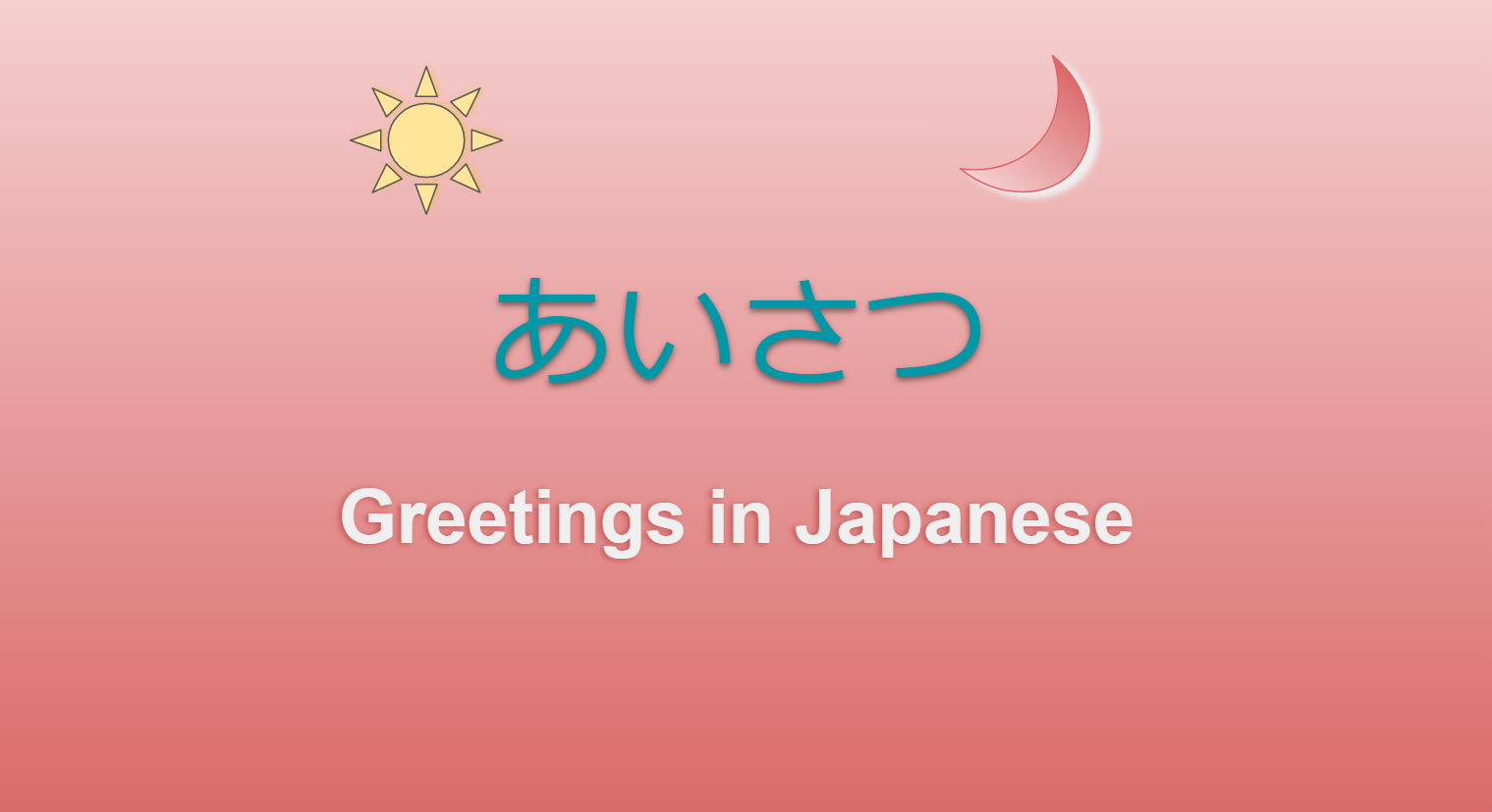JLPT N5 Resources - Vocabulary List 10

Vocabulary List - 09
Words Starting With 「わ」and other miscellaneous words
わ-行(わ-ぎょう) is the 10th row of the Japanese syllabary system. The character わ represents a sound consisting of consonant and vowel together. In romaji it is written as wa.*This list is a tentative guide (based on past exams) that is likely to match the exam requirements for the JLPT Level N5. Before 2010, there were only 4 levels of the JLPT, and the testing agency released official vocabulary and grammar lists for each level. As of 2010, the JLPT authority no longer publishes an official vocabulary list.
わ
|
Furigana
|
Kanji
|
Meaning
|
692
|
ワイシャツ
|
business shirt
| |
693
|
わかい
|
young
| |
694
|
わかる
|
分かる
|
to understand
|
695
|
わすれる
|
to forget
| |
696
|
わたくし
|
(humble) I,myself
| |
697
|
わたし
|
myself
| |
698
|
わたす
|
to hand over
| |
699
|
わたる
|
to go across
| |
700
|
わるい
|
bad
|
Other words:
- Particles
- Greetings and phrases used in daily conversations
- Words used as counters for counting different kinds of objects (animated/unanimated), items or things, and lastly,
- Place names and person names that used frequently in beginner level textbooks.
Particles:
Furigana
|
Meaning
| |
1
|
は
|
(Pronounced as WA), topic identifier
|
2
|
も
|
Topic identifier, replaces は and が. Meaning - also
|
3
|
か
|
Question indicator
|
4
|
が
|
Subject indicator / identifier
|
5
|
に
|
Direction indicator, identifying indirect object, identifying passive agent. So based on the usage meaning can be - to, in, at, by.
|
6
|
へ
|
(Pronounced as E).Direction indicator - to, in
|
7
|
の
|
Functions as: possession indicator, noun link, topic marker of subordinate clauses.
|
8
|
を
|
Object identifier
|
9
|
と
|
Meaning can be - with, and, if. Also used to indicate quotation.
|
10
|
で
|
Meaning can be - at, by means of
|
11
|
から
|
Meaning can be - from, after, because
|
12
|
まで
|
Indicates a time or place as a limit. Meaning can be - up to, until, as far as
|
Greetings and phrases in conversations:
Furigana
|
Meaning
| ||
1
|
あ
|
Ah!
| |
2
|
ああ
|
Ah! Oh I see
| |
3
|
あの
|
Say…, well..., err...
| |
4
|
あのう
|
Say…, well..., err...
| |
5
|
ありがとうございました
|
Thank you*
| |
6
|
ありがとうございます
|
Thank you*
| |
7
|
いいえ
|
No
| |
8
|
いえ
|
No
| |
9
|
いかがですか?
|
Are you okay? Or how are you?
| |
10
|
いただきます
|
Expression of gratitude before meals
| |
11
|
いってきます
|
An expression before leaving home (lit. will come back)
| |
12
|
いらっしゃいませ
|
Expression of welcoming guests, patrons
| |
13
|
うーん
|
Umm...let me see
| |
14
|
え
|
Oh!
| |
15
|
ええ
|
Yes
| |
16
|
えー
|
Oh...let me see
| |
17
|
えっ
|
Oh!
| |
18
|
おげんきで
|
Wish you be sound and safe
| |
19
|
おねがいします
|
Please!
| |
20
|
おはようございます
|
Good Morning!
| |
21
|
おやすみなさい
|
Good Night!
| |
22
|
ください
|
Please
| |
23
|
ごちそうさまでした
|
Thank you for the meal
| |
24
|
こちらこそ
|
From my side as well (thank you etc.)
| |
25
|
ごめんください
|
Pardon me (more polite)
| |
26
|
ごめんなさい
|
Pardon me (polite)
| |
27
|
こんにちは
|
Good Afternoon!, Hello!
| |
28
|
こんばんは
|
Good Evening!
| |
29
|
さあ
|
Well...
| |
30
|
さようなら
|
Good Bye!
| |
31
|
しつれいしました
|
I’m sorry (as I need to go now, talk now or interrupting or initiating a conversation etc.)
| |
32
|
しつれいします
|
I’m sorry (as I need to go now, talk now or interrupting or initiating a conversation etc.)
| |
33
|
じゃ
|
Bye bye or well then
| |
34
|
じゃあ
|
Bye bye or well then
| |
35
|
じゃあ また
|
Bye bye and see you again
| |
36
|
すみません
|
Excuse me...
| |
37
|
そうしましょう
|
Let’s do it
| |
38
|
そうです
|
Yes, that’s right
| |
39
|
そうですか?
|
Is that?
| |
40
|
そうですね
|
You are right
| |
41
|
ただいま
|
I’m back (at home)
| |
42
|
では
|
Well then
| |
43
|
どういたしまして
|
No problem, nothing to mention, you’re welcome!
| |
44
|
どうぞ
|
Please proceed...
| |
45
|
どうも
|
Thank you
| |
46
|
どうもありがとう
|
Thank you
| |
47
|
はい
|
Yes
| |
48
|
はい そうです
|
Yes that’s right
| |
49
|
はじめまして
|
Nice to meet you
| |
50
|
よろしく
|
Wish your favor, regards
| |
Words used as counter
(Some kanjis that mentioned here may not be tested for N5 level)
Furigana
|
Meaning
| ||
1
|
つ [tsu]
|
General-purpose counter. Counting number of things: 一つ [ひとつ] (one thing), 二つ [ふたつ] (two things), 三つ [みっつ] (three things), etc.
| |
2
|
り [ri]
|
People, used in the words 一人 (ひとり), 二人 (ふたり)
| |
3
|
にん [nin]
|
Counting people; 四人 [よにん], 六人 [ろくにん] etc.
| |
4
|
だい [dai]
|
Cars, bicycles, machines, mechanical devices, household appliances etc. 一台 [いちだい], 二台 [にだい], 三台 [さんだい]
| |
5
|
はい [hai], ぱい [pai], ばい [bai]
|
Used for counting cups and glasses of drink etc. 一杯 [いっぱい], 二杯 [にはい], 三杯 [さんばい]
| |
6
|
ひき [hiki], ぴき [piki], びき [biki]
|
Used for counting small animals, insects, fish, reptiles etc. 一匹 [いっぴき], 二匹 [にひき], 三匹 [さんびき]
| |
7
|
ほん [hon], ぽん [pon], ぼん [bon]
|
Counter for long, thin objects: rivers, roads, train tracks, ties, pencils, bottles, guitars etc. 一本 [いっぽん], 二本 [にほん], 三本 [さんぼん]
| |
8
|
かい [kai], がい [gai]
|
Used for counting number of floors, stories etc. 一階 [いっかい], 二階[にかい]
| |
9
|
こ [ko]
|
Counter for small objects or things 一個 [いっこ], 二個 [にこ], 三個 [さんこ]
| |
10
|
まい [mai]
|
frequently used word Thin, flat objects: sheets of paper, photographs, plates, 一枚 [いちまい], 二枚 [にまい]
| |
11
|
ふん [fun], ぷん [pun]
|
Counter for minutes 一分 [いっぷん], 一分 [にふん]
| |
12
|
がつ [gatsu], also つき [tsuki]
|
Months of the year. Month-long periods when read tsuki 一月 [いちがつ], 二月 [にがつ], 三月 [さんがつ]
| |
13
|
じ [ji]
|
Hours of the day 一時 [いちじ], 二時 [にじ], 三時 [さんじ]
| |
14
|
じかん [jikan]
|
Hour-long periods, 一時間 [いちじかん], 二時間 [にじかん], 三時間 [さんじかん]
| |
15
|
か [ka]
|
Day of the month 二日 [ふつか] (2nd day of the month), 六日 [むいか] (sixth day of the month), 七日 [なのか] (seventh day of the month)
| |
16
|
にち [nichi]
|
Counter of days 一日 [いちにち] (one day), 二日 [ににち] (two days), 三日 [さんにち] (3 days)
| |
17
|
しゅう [shū]
|
Weeks 一週 [いっしゅう], 二週 [にしゅう], 三週 [さんしゅう]
| |
18
|
ねん [nen]
|
Years, school years (grades); 一年 [いちねん], 二年 [にねん], 三年 [さんねん]
| |
19
|
さい [sai]
|
Years of age 一歳 [いっさい], 二歳 [にさい], 三歳 [さんさい]
| |
20
|
かい [kai]
|
Occurrences, number of times 一回 [いっかい], 二回 [にかい],
| |
21
|
ばい [bai]
|
Multiples, times, -fold as in "twofold" 一倍 [いちばい], 二倍 [にばい]
| |
22
|
ばん [ban]
|
Position, turn, sports matches 一番 [いちばん], 二番 [にばん], 三番 [さんばん]
| |
23
|
ど [do]
|
Occurrences, number of times, degrees of temperature 一度 [いちど], 二度 [にど], 三度 [さんど]
| |
Place names and person names
(the common names that frequently appeared in various textbooks for beginners, most kanjis that mentioned here for person names and place names will not be tested in JLPT N5 level)
Furigana
|
Meaning
| ||
1
|
とうきょう (東京)
|
Tokyo
| |
2
|
にほん / にっぽん[日本]
|
Japan
| |
3
|
にっこ [日光]
|
Nikko
| |
4
|
しんじゅく
|
Shinjuku
| |
5
|
きょうと [京都]
|
Kyoto
| |
6
|
なら [奈良]
|
Nara
| |
7
|
おさか [大阪市]
|
Osaka
| |
8
|
こべ
|
Kobe
| |
9
|
さいたまけん
|
Saitama Prefecture
| |
10
|
ちばけん
|
Chiba Prefecture
| |
11
|
ふじやま
|
Fuji Mountain
| |
12
|
さとう[佐藤]さん
|
Mr. / Ms. Sato
| |
13
|
なかむら[中村]さん
|
Mr. / Ms. Nakamura
| |
14
|
たなか[田中]さん
|
Mr. / Ms. Tanaka
| |
15
|
すずき[鈴木]さん
|
Mr. / Ms. Suzuki
| |
16
|
イギリス
|
England
| |
17
|
アメリカ
|
America
| |
18
|
タイ
|
Thailand
| |
19
|
ちゅうごく
|
China
| |
20
|
かんこく
|
Korea
| |
JLPT N5 Resources: Vocabulary Lists:
- JLPT N5 Resources - Vocabulary List - 01
- JLPT N5 Resources - Vocabulary List - 02
- JLPT N5 Resources - Vocabulary List - 03
- JLPT N5 Resources - Vocabulary List - 04
- JLPT N5 Resources - Vocabulary List - 05
- JLPT N5 Resources - Vocabulary List - 06
- JLPT N5 Resources - Vocabulary List - 07
- JLPT N5 Resources - Vocabulary List - 08
- JLPT N5 Resources - Vocabulary List - 09
Other Lessons:
- Lesson 1: Why Japanese Language
- Lesson 2: JLPT N5 Introduction
- Lesson 3: Hiragana Part 1
- Lesson 4: Hiragana Part 2
- Lesson 5: Katakana Part 1
- Lesson 6: Katakana Part 2
- Lesson 7: Kanji Part 1
- Lesson 8: Japanese Everyday Greetings
- Lesson 9: Japanese Particles Introduction
- Lesson 10: Grammar Time
- Lesson 11: Verb Basic
- Lesson 12 - Vocabulary
- Lesson 13 - Grammar - Verb: Part 2
- Lesson 14 - Kanji - Part 2
- Lesson 15 - Grammar - Verb: Part 03
- Lesson 16 - Grammar: Verb Part 04



